

GENESIS - World of Genesis. The Holy Trinity: Genesis. Above: Peter Gabriel in garb for “Supper’s Ready” (Foxtrot) There are several things that make it challenging to discuss old school Genesis.

First, virtually everyone knows and probably prefers the Phil Collins incarnation (or worse, people detest that outfit, which became increasingly hit-friendly and predictable throughout the ‘80s). Second, most folks, except prog fans, are unfamiliar with the albums made when Peter Gabriel fronted the band. Third, there is the whole Peter Gabriel is God factor. I just made that up, but Peter Gabriel is God: in addition to creating a justly venerated catalog as a solo artist, his more “mature” work gives prog-haters and hipsters an opportunity to dismiss the work he did in his wild and hazy years. And make no mistake, they were wild and hazy.
Not unlike Yes, Genesis took some time to get their bearings, and it was on their third album that everything clicked. And make no mistake, there are all kinds of mellotron on these three albums. Where to begin? In Defense Of ... Both the Phil Collins and Peter Gabriel Eras of Genesis. With Collins’ recent rumblings about returning to music, it’s time to lay the “which era is better” question to rest.

“I have started thinking about doing new stuff ... some shows again, even with Genesis. Everything is possible. We could tour in Australia and South America. We haven’t been there yet.” (“Phil Collins announces return to music”, by Lowenna Waters, The Telegraph, 5 December 2013) This was what singer/drummer Phil Collins said to German media a month or two ago. This is great news for the casual Collins’ fan, but it’s an even better quote for the die-hard Genesis enthusiasts to digest.
Tribute. Musiciens. Peter Gabriel. Phil Collins. Tony Banks. Steve Hackett. Genesis. For the video game console, see Sega Genesis.
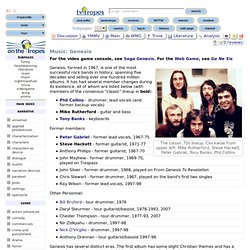
For the Web Game, see Ge Ne Sis The classic 70s lineup. Genesis - Official Website. Genesis (groupe) Un article de Wikipédia, l'encyclopédie libre.
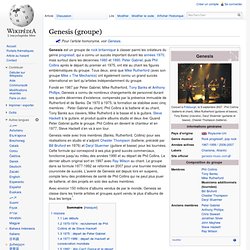
Genesis - Cryme Of Passion. Celesteland: Genesis - Clasico de Clasicos. Los adolescentes Peter Gabriel,Mike Rutherford, Anthony Phillips,Tony Banks y Chris Stewart comenzaron su camino musical en la escuela secundaria Charterhouse Godalming, Inglaterra, componiendo sencillos para el joven productor Jonathan King.

El nombre del grupo alude al Genesis, primer libro de la Biblia. Sus composiciones de ese breve período fueron lanzadas como su álbum debut From Genesis to Revelation (es decir, "desde el Génesis hasta el Apocalipsis") en 1969. The Waiting Room - Home. Foxtrot - Genesis. Foxtrot is where Genesis began to pull all of its varied inspirations into a cohesive sound -- which doesn't necessarily mean that the album is streamlined, for this is a group that always was grandiose even when they were cohesive, or even when they rocked, which they truly do for the first time here.
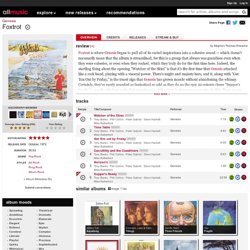
Indeed, the startling thing about the opening "Watcher of the Skies" is that it's the first time that Genesis attacked like a rock band, playing with a visceral power. There's might and majesty here, and it, along with "Get 'Em Out by Friday," is the truest sign that Genesis has grown muscle without abandoning the whimsy. Certainly, they've rarely sounded as fantastical or odd as they do on the epic 22-minute closer "Supper's Ready," a nearly side-long suite that remains one of the group's signature moments. Genesis vidéo playlist. Genesis-be.com - Nursery cryme - une vidéo Musique. From Genesis to Revelation - Genesis.
This Genesis collection, which has appeared under license to various labels in addition to Decca and London in different configurations, is largely of historical interest.
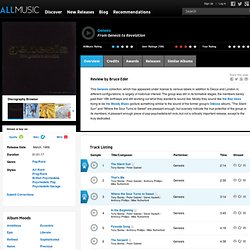
The group was still in its formative stages, the members barely past their 18th birthdays and still working out what they wanted to sound like. Mostly they sound like the Bee Gees trying to be the Moody Blues (picture something similar to the sound of the former group's Odessa album). "The Silent Sun" and "Where the Sour Turns to Sweet" are pleasant enough, but scarcely indicate the true potential of the group or its members. A pleasant enough piece of pop-psychedelia/art rock, but not a critically important release, except to the truly dedicated. The Musical Box. Live - Genesis. In early 1973, Genesis allowed the taping of a couple of live shows for broadcast in America as part of the King Biscuit Flower Hour syndicated radio show -- most of their current set, drawn from their albums up through 1972's Foxtrot, was represented.
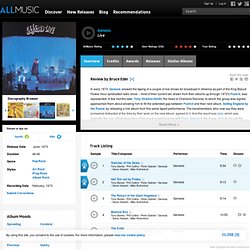
Nursery Cryme - Genesis. If Genesis truly established themselves as progressive rockers on Trespass, Nursery Cryme is where their signature persona was unveiled: true English eccentrics, one part Lewis Carroll and one part Syd Barrett, creating a fanciful world that emphasized the band's instrumental prowess as much as Peter Gabriel's theatricality.
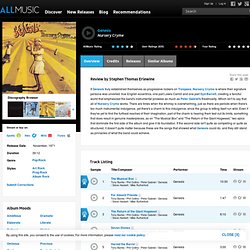
Which isn't to say that all of Nursery Cryme works. Trespass - Genesis. Genesis' first truly progressive album, and their first record for the Charisma label (although Trespass was released in America by ABC, which is how MCA came to have it), is important mostly as a formative effort.
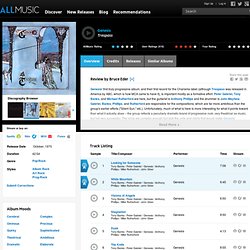
Peter Gabriel, Tony Banks, and Michael Rutherford are here, but the guitarist is Anthony Phillips and the drummer is John Mayhew. Gabriel, Banks, Phillips, and Rutherford are responsible for the compositions, which are far more ambitious than the group's earlier efforts ("Silent Sun," etc.). Unfortunately, much of what is here is more interesting for what it points toward than what it actually does -- the group reflects a peculiarly dramatic brand of progressive rock, very theatrical as music, but not very successful.
The lyrics are complex enough but lack the unity and clarity that would make Genesis' subsequent albums among the most interesting of prog rock efforts to analyze. Selling England By The Pound (1973) The Lamb Lies Down on Broadway (1974)